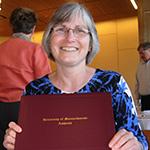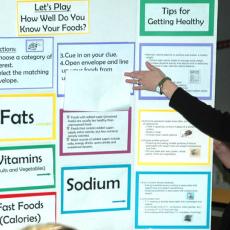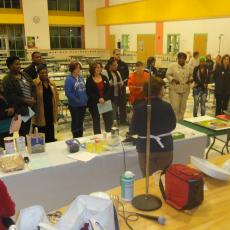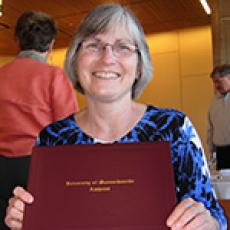In Our Spotlight
SNAP-Ed Programs
Against the national backdrop of proposed budget cuts to the Supplemental Nutrition Assistance Program (SNAP) – formerly known as Food Stamps – the value of SNAP-Ed seems clearer than ever here in Massachusetts. SNAP has an educational companion program called SNAP-Ed, with programming provided to those eligible for SNAP food benefits. SNAP-Ed programs in Massachusetts are provided by UMass Extension and other agencies.
“Give a man a fish and he will eat for a day. Teach him how to fish and he will eat for a lifetime.”
It is not exactly news that education is a key factor in tackling poverty. And SNAP-Ed extends the investment made in the SNAP program – it makes SNAP dollars go further by providing education to improve the food choices of SNAP participants. Here in the Commonwealth, the value of education for changing lives cannot be underestimated. Knowledgeable and eager nutrition educators from UMass Extension are reaching out to low-income families in 44 Massachusetts communities to teach them to make healthy food choices and incorporate physical activity, all on limited incomes.
Healthy eating is a learned skill. SNAP-Ed teaches this skill and has a lifelong impact on health. By educating at-risk populations about making healthier choices within their means, UMass nutrition educators have documented success and positive impacts at educating low-income families about nutrition issues that contribute to ballooning health care costs. It's actually intuitive: better nutrition means lower obesity rates means fewer health-related issues.
Lisa Sullivan-Werner, Nutrition Education Program Director at UMass, is an enthusiastic supporter of SNAP-Ed. She said, “We are able to reach significant numbers of families who participate in SNAP. In FY 2012, the UMass SNAP-Ed program reached 2,617 adults and 51,241 youth through workshops and a total of 427,872 adults and youth through indirect education such as newsletters, displays, and farmers’ market food demonstrations.”
SNAP-Ed focuses on true sustainable behavior change and the results here in Massachusetts speak for themselves - over 75% of parents whose children participated in a series of SNAP-Ed lessons said that their children were eating more fruits and vegetables and were more physically active. Over two-thirds of parents whose children participated in a series of SNAP-Ed lessons said that their children were more willing to try new and healthy foods and that they had increased their own consumption of fruits and vegetables, increased their willingness to try new healthy foods, and increased their level of physical activity. Parents said the program had really made a difference to their families: “My children come home wanting less ‘junk food’ and they are both eating more fruits and veggies for snacks”, “My children talk about what was discussed at school and help our family make healthy choices at the grocery store. They also talk about burning calories and getting stronger through physical activity”, and “I am very satisfied with the way my daughter is eating now. Healthier and always tells me ‘mom you have to try new foods’. Not only does she tell me, she tells everyone now!”
Sullivan-Werner recently received one of ten UMass Amherst Chancellor’s Citation Awards for 2013 for her work with SNAP-ED. Read more here. [www.umass.edu/sphhs/news-events/sullivan-werner-receives-chancellors-citation-excellence-award]
Comprehensive UMass Extension SNAP-Ed program Impacts for 2012 are attached here. More program information is available here. [ag.umass.edu/nutrition/snap-ed]
Selected Snapshots From UMass Extension Around the State
Springfield
Pat Harmsen, Project Leader, UMass Extension Nutrition Education Program serving Springfield, Holyoke and surrounding communities
Pat has worked with SNAP-Ed for 15 years. She has been successful in building important coalitions and networks with many groups in the communities she serves to decrease chronic disease and obesity and increase healthier food options.
Over the years, her office has worked closely with the Department of Transitional Assistance, offering food demonstrations at each of their four sites in the region, and providing handouts for clients, including nutritious recipes. Some vital collaborations are with area farmer’s markets, school districts and elderly housing developments. In the coming year, they are planning to focus on elementary schools as they share nutrition and health education to continue to change lives for the better.
Boston
Tracie Gillespie MPH, Project Leader, UMass Extension Nutrition Education Program
In the Boston and Somerville public schools, Tracie’s program teaches a 6-week cycle of nutrition classes to students in grades K-8. She is thrilled each year when she walks into a classroom and the students remember what she taught them the previous year. She remarked, “When I ask them to name the nutrients and tell me what they do for our body, the first one they shout out is 'car-bo-hydrate' with the actions 'car'- pretending to drive, 'bo'- pulling a bow and arrow, and 'hydrate'- drinking a water bottle. I don't know of any other subject where students can recall with such clarity something they learned a year ago!
Upon meeting with school collaborators in 2012, their middle school students had just completed a health survey and the nutrition scores were in the high 90s for what the students knew and had learned compared to the other health topics. The high scores of the nutrition category were attributed to the program taught through SNAP-Ed.
Brockton
Jane Feroli-Specialist for Parent Engagement, Brockton Public Schools: UMass Extension collaborator
Jane is a passionate supporter of SNAP-Ed for families with whom she works in Brockton Public Schools. Jane works closely with Andrea Gulezian, local UMass Extension Project Leader, to create and hold “Parent Academy” workshops. They send newsletters with tips on nutrition and nutrient-dense recipes. Together, they develop workshops on interesting topics such as: International Night, Grow Green (environmental themes), Farm to Table, Olympic Family Fitness Night, and Family Cooking Nights similar to Food Network cooking shows. Evaluations receive high marks and positive comments from participants about what they learned:, “Eating healthy foods that taste amazing. Tips to be a better shopper were excellent. Learning about MyPlate and whole grains.” Based on their attendance numbers (anywhere from 30-200 adults and children each night and a total of 12,146 people over 14 years of Family Health Nights) they are definitely on the right track as they deliver nutrition education to those who need it most.
UMass Extension SNAP-ED Framework
The UMass Extension SNAP-Ed program is part of a national nutrition education effort funded through the U.S. Department of Agriculture's Supplemental Assistance Program (SNAP). The overarching goal of SNAP-ED is to provide nutrition education programs and activities that help adults and youth eligible for SNAP to establish healthy eating habits and physically active lifestyles. To achieve this goal, Extension staff, based at UMass Amherst and in six field offices (Boston, Brockton, Fall River, Lawrence, Springfield, and Worcester), work in partnership with over 49 collaborators throughout the Commonwealth.
All SNAP-ED projects are planned and implemented with community partners who devote time and resources and are highly invested in the program. These partnerships multiply the programming power of the SNAP-Ed program. University faculty and staff work closely with community agencies, school systems and other collaborators in developing an array of educational workshops, events and materials that are informative and engaging. The resulting statewide program has been consistently successful at promoting healthy lifestyle choices with regard to food and physical activity.
The Mass. Context: Two of the Groups Combatting Hunger in the State
Project Bread
Project Bread, a Boston-based non-profit organization, is committed to ending hunger in communities across Massachusetts. Each year, it creates a Status Report on Hunger in Massachusetts. In 2012, they noted that the food insecurity rate has grown by over 43 % since the start of the recession in 2008. This is the highest rate recorded in the Commonwealth since this data was first collected in 1995. According to Sarah Cluggish, Director of Programs, “SNAP is one of the most effective responses to hunger that we have for the most vulnerable populations in our state – children, seniors and working poor families. However, when families go shopping or try to prepare meals on their limited SNAP budget, they often feel overwhelmed and end up choosing relatively “cheap,” calorie-dense foods to stretch their dollars. Programs such as SNAP-ED and Project Bread’s Chefs in Head Start Initiative, teach families and seniors how to purchase and cook healthy food on a budget that their whole household will eat. It empowers people struggling with food insecurity, improves their health outcomes and lessens the negative impact of hunger.
Food Bank of Western Massachusetts
Andrew Morehouse, Executive Director at the Food Bank of Western Massachusetts, reports that 71% of the people his agency serves live in poverty. Nearly half of them have had to choose between buying food and paying for utilities, rent, mortgage or medical care. They partner with many local pantries and meal sites across Western Massachusetts and have also recruited 128 volunteers at meal sites who do outreach by referring interested and potentially eligible people to receive SNAP-Ed benefits. According to Morehouse, “More than 135,000 people across the four counties of W. Mass. rely on food that comes from The Food Bank through 300 local feeding programs – pantries, meal sites and shelters and other social service programs – across the four counties of our region. Without SNAP and SNAP-Ed, our region’s emergency food network would be overwhelmed by vulnerable households seeking food assistance. As it stands now, more than 166,000 individuals receive SNAP benefits, providing essential income to put food on their tables. Not only does SNAP support individuals – primarily elders and households with children – but it also has a tremendous economic impact on local businesses and jobs. SNAP benefits total more than $241 million annually in W. Mass. alone, generating $444 million in total economic activity.”
Supplemental Nutrition Assistance Education Program Impacts
In FY 2012, the UMass SNAP-Ed program reached 2,617 adults and 51,241 youth through direct education methods and a total of 427,872 adults and youth through indirect education methods.
Reaching Those in Need
- SNAP-Ed is delivered in the lowest income communities in Massachusetts.
- Adult participants were reached at SNAP offices, food pantries, pregnant and parenting teen programs, job training programs, WIC program sites, community health centers, mental health clubhouses, and farmers' markets located in low income areas.
- Preschool and youth participants were reached at Head Start Programs, schools in low income areas, summer recreation programs, parks, summer feeding sites, afterschool programs, and Boys & Girls Club sites.
Using Effective Methods
- SNAP-Ed staff and educators work with local collaborators to design programs and select nutrition education materials that will meet local needs (including workshop series, single session workshops, displays, posters, newsletters, and follow-up enrichment materials).
- SNAP-Ed provides newsletters and follow-up nutrition education materials to parents of participating youth to reinforce what their children have learned.
- SNAP-Ed provides follow-up lessons and materials for teachers and nurses in schools where SNAP-Ed educators conduct a series of lessons.
- A blog and telephone tip line provide weekly tips for making the most of SNAP benefits.
Influencing Families
- Parents/caretakers of youth participating in a series of UMass SNAP-Ed nutrition education lessons reported that their children made the following changes:
- 76.1% increased consumption of fruits and vegetables.
- 69.4% increased willingness to try new healthy foods.
- 84.7% increased willingness to eat healthy foods.
- 65.5% improved grain food choices (whole grain vs. refined grain choices).
- 67.1% switched to fat-free or low-fat milk or equivalent milk products.
- 78.2% increased levels of physical activity.
- Parents/caretakers of youth participating a series of UMass SNAP-Ed nutrition education lessons reported that they themselves made the following changes:
- 73.9% increased consumption of fruits and vegetables.
- 70.7% increased willingness to try new healthy foods.
- 81.5% increased willingness to eat healthy foods.
- 70.2% improved grain food choices (whole grain vs. refined grain choices).
- 62.8% switched to fat-free or low-fat milk or equivalent milk products.
- 70.7% increased levels of physical activity.
- 83.0% talk more to their child about healthy eating and physical activity.
Influencing Youth
- Teachers of youth participating in a series of UMass SNAP-Ed nutrition education lessons reported the following changes:
- 89.1% said their students were more interested in foods, nutrition, and healthy eating as a result of the nutrition education lessons.
- 68.4% said their students were more willing to try new foods.
- 65.5% said their students made healthier food choices.
- 62.9% said that their students more often washed their hands.
Involving the Community
- Staff in 8 SNAP-Ed sites worked with 49 collaborating schools and agencies and 22 Transitional Assistance Offices (SNAP Offices) to develop and implement SNAP-Ed in FY 2012.
- Program activities were delivered at:
- 203 public schools.
- 29 youth education/recreation sites.
- 24 farmers' markets.
- 22 Transitional Assistance offices
- 16 Head Start program sites.
- 5 adult education and job training sites.
- 5 parks and recreation programs.
- 3 day care sites.
- 3 emergency food assistance sites.
- 3 public housing sites.
- 2 WIC program sites.
- 2 pregnant and parenting teen program sites.
- 2 mental health clubhouse sites
- 1 community health center.
- 1 community center.
- 1 church.
- 1 elderly service center.









